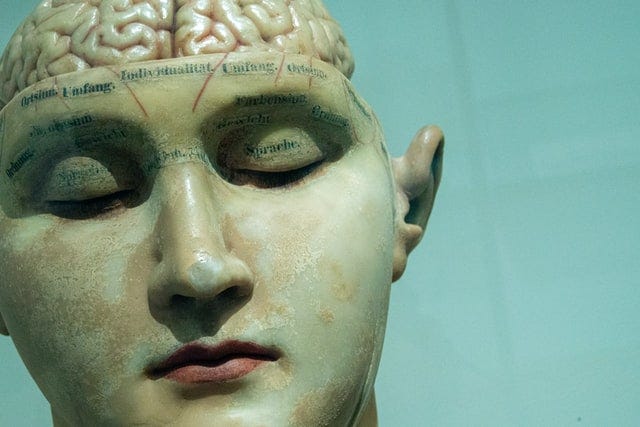The Purpose of Propaganda
- Piper Hendricks

- May 2, 2023
- 6 min read
Updated: Aug 27, 2025
My mom loves her cryptogram. Every day, she dutifully completes the word puzzle in our local paper then, without context needed, texts me the quote. One day before I’d finished breakfast, my phone buzzed with this message:
The purpose of propaganda is to make one set of people forget the other sets of people are human.
- Aldous Huxley
Huxley was an English writer and philosopher born in 1894. He died in 1963, meaning he lived through major historical events, not the least of which were two World Wars.
We live in an era of low trust and high tensions. It’s a critical time to be mindful of what we’re putting into our heads and hearts.
For example, a family member once shared a video clip with me that made my blood boil. It was around the time of Ketanji Brown Jackson’s confirmation to the U.S. Supreme Court, covered by outlets said to lean left and others that lean right, and the topic of disinformation felt even more pressing.
If you also have someone in your family or a close friend who is consuming media that skews their views and leaves them mis-(or dis-)informed, this post is for you. I understand the frustration — and the pain — you may be experiencing. I share this perspective with hope to support productive conversations.
I don’t remember the name of the outlet that produced the video clip I saw and, even if I did, I wouldn’t direct your eyeballs there. What I do remember is the host was a middle-aged man with a British accent, let’s call him “M,” sharing an excerpt from a press conference given by a prominent American politician we’ll call “P.”
The excerpt of P’s remarks included no context; it was simply several moments of P at a podium navigating a question from the press. After playing the excerpt, M made several derogatory guesses about P’s mental state. M then brought on a reporter who is a young woman we’ll call “Y” for a split-screen session of merciless mocking, which M led with prompts like “Y, wouldn’t you agree that…?” and “Y, wouldn’t you say that…?” The age differences were such that P, a woman with decades of experience, could easily be Y’s grandmother.
My family member and I agreed on one thing: this 180-second video made our heads explode — but for very different reasons.
My family member watched the video and, in keeping with the overall narrative from M, saw “evidence” of “yet another inept politician running the country.”
From the same video, I saw someone with deep knowledge of Congressional procedure who, because she was speaking to a press corps also familiar with that procedure, used shorthand references and wonky terms that, taken out of context, could sound downright odd.

You can guess the four key words of that last sentence: “taken out of context.”
And THAT’S what made my head explode: the outlet provided precisely ZERO context for or in the video. The sole purpose of the entire “news” segment was to mock a politician whom many people love to hate by running several moments of video that wouldn’t possibly make sense without context.
The segment provided precisely zero information about the substance of the press conference and left precisely zero people more informed about the news of the day. But it sure left a lot of people — sadly, my family member included — angrier than they already were, while also depicting a young woman following the lead of an older man in denigrating an older woman’s accomplishments instead of celebrating them.
While my age is somewhere between these two women, I am too old to have had media literacy training in school as the concept simply didn’t exist then. But as a voracious consumer of media, including podcasts, online news, television news, and newsletters from as far across our country’s political spectrum as I can reach, I’ve come to conclude that there are three types of news in today’s world:
News that seeks to inform.
“News” that seeks to enrage.
“News” that seeks to deceive.
As I discussed with my family member, to live well, we need to aware of the type(s) of news we are consuming. Like the food we put in our bodies, we’ve simply got to pay attention to what we put in our heads these days. Our “media diet” — what we read, listen, and watch — feeds our mind, our thoughts, our beliefs, and, in turn, our actions.
News outlets that seek to inform are like eating your vegetables, ensuring you get enough protein and healthy fats, and drinking plenty of water. Just as no single food is the source of all nutrients you need, no single outlet is sufficient; getting a full picture of the issues that matter to you requires at least a few reliable sources. That balanced diet isn’t always the most fun, but darn if you don’t function better when you keep one.
News outlets that seek to enrage are like processed foods: they taste good going down, but leave you irritable, lethargic, unsettled, and downright unhealthy.
News outlets that seek to deceive are like heroin and Schedule 1 substances that serve no legitimate purpose. We have no use for that content, and people, organizations, and outlets peddling it are destroying lives.
*To be clear, news that seeks to inform may also enrage you. In fact, as the quote often attributed to Mother Jones goes, “If you aren’t outraged, you aren’t paying attention.” But the difference is whether you are left truly informed and angry, or just angry.
Whether it be by turning on a program on a particular channel at a particular time or by pressing play on a video related to current events that comes through a social media feed, people who watch the news do so — at least in part — to be informed. With the nearly infinite amount of other content available, consuming anything related to current events signals a desire to know what’s going on in the world.
But unlike the difference between a plate of chicken with steamed broccoli, and a corn dog with super-sized fries, the difference in types of news isn’t always so obvious — especially when we don’t examine the sources, question their motivations, or examine their impact.
Gone are the days of reading whatever shows up in the folded paper on your doorstep or turning on an evening program and passively taking it in. LONG gone. And that may be harder for older generations who didn’t need to be as vigilant as we do today. But I believe that like an unhealthy physical diet can drastically reduce your quality of life, so too can an unhealthy media diet. In fact, I’m hard pressed to say which is more urgent.
I think both are killing us.
If you or someone you know has an unhealthy media diet, consider this set of questions I shared with my family member:
Is this source truly trying to inform me of a development in my community or in the world that is important for me to know? Or is the main goal to leave me angry?
Does this source try to give me the full picture of this development? If there is a video excerpt, do I know where it came from and what was happening?
Do I ever hear anything new from this source or anything that challenges my way of thinking?
Do I hear from people who have very different lives than I do? If so, is the purpose to help me understand their perspectives? (Or do I just hear about them? And in a derogatory way?)
Does this source regularly cite its sources, and are those sources credible?
Can I find confirmation of this news in other sources? (And keep in mind that if “the other side” isn’t saying anything, that does NOT mean you’ve discovered the sole reliable source and everyone else is hiding the truth.)
How does this source decide what topics to cover — and what does it choose not to cover? Put another way, what part of the story am I not seeing from this source?
Unfortunately, it’s easy to take the news as gospel, especially if we see a snippet of something with our own eyes or hear with our own ears. But human constraints mean all coverage will be partial — as in “incomplete” and as in “biased.” Forgetting that the pieces we see and hear are selected is to be spoon-fed rather than to consciously consume.
The good news is this is not a post asking anyone to change anything in their actual diet. If your loved one likes to eat curly cheese fries for breakfast, lunch, and dinner, and wash them down with a hard cider, go for it.
But, as I shared with my family member: “I am begging you not to consume the equivalent in your media diet. You deserve better.”
We all do.




